Dayglow Plays M3F
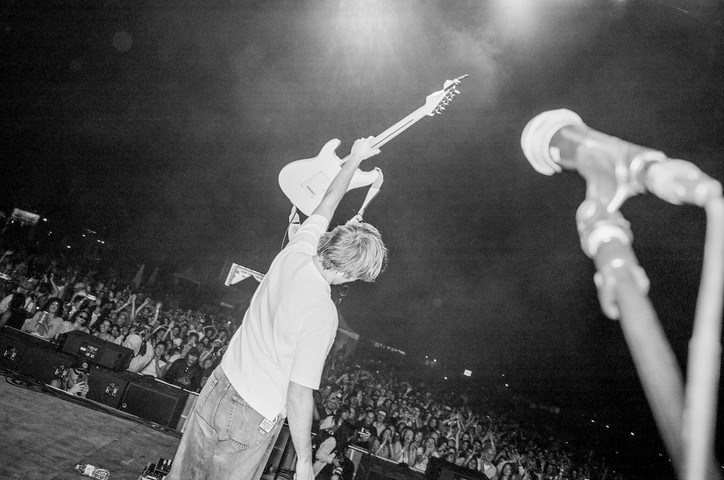
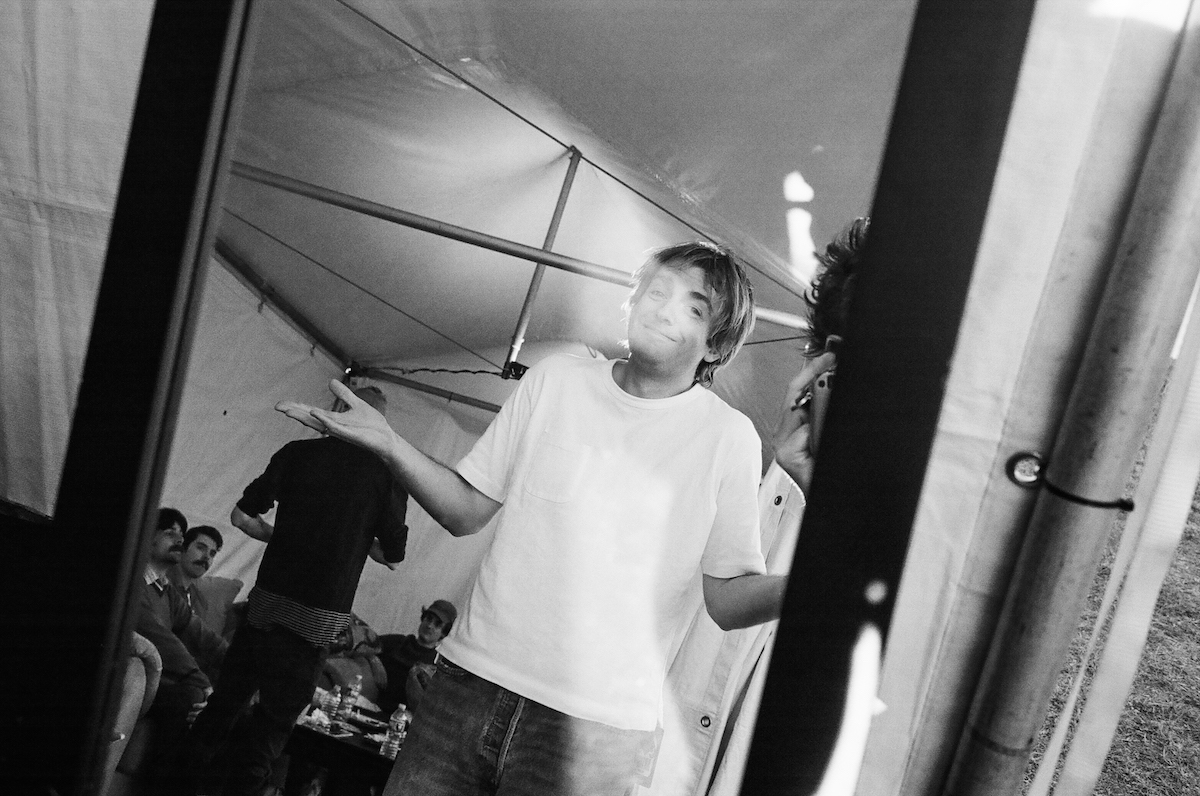
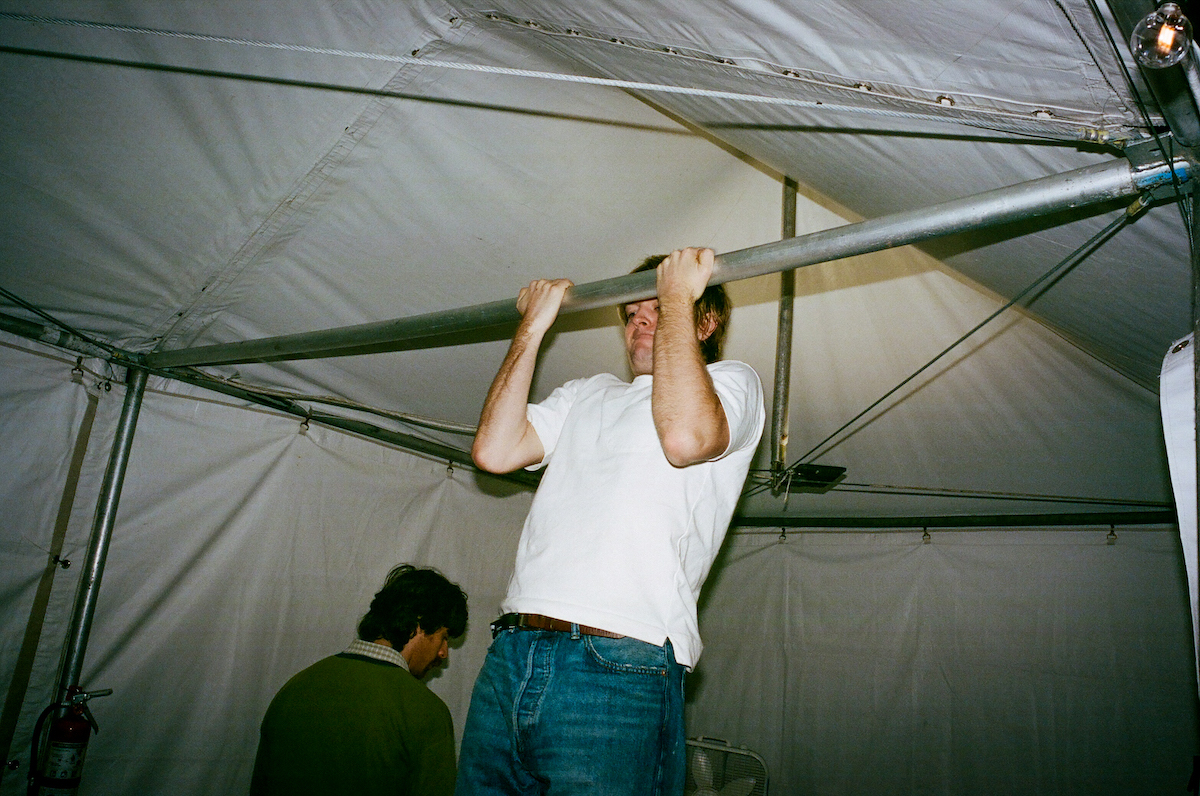
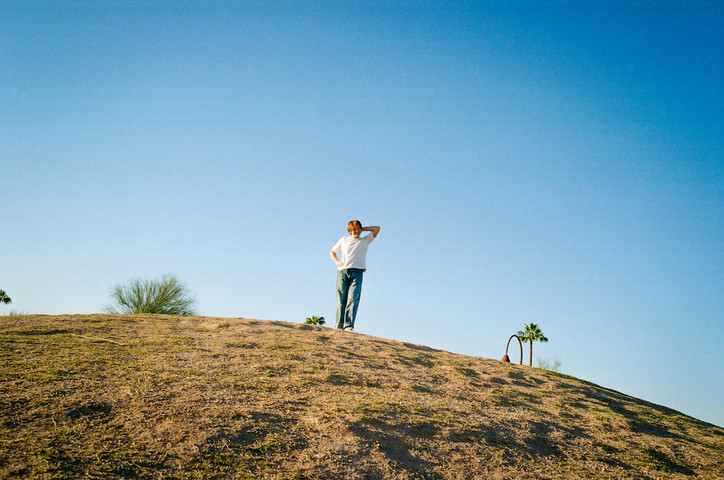
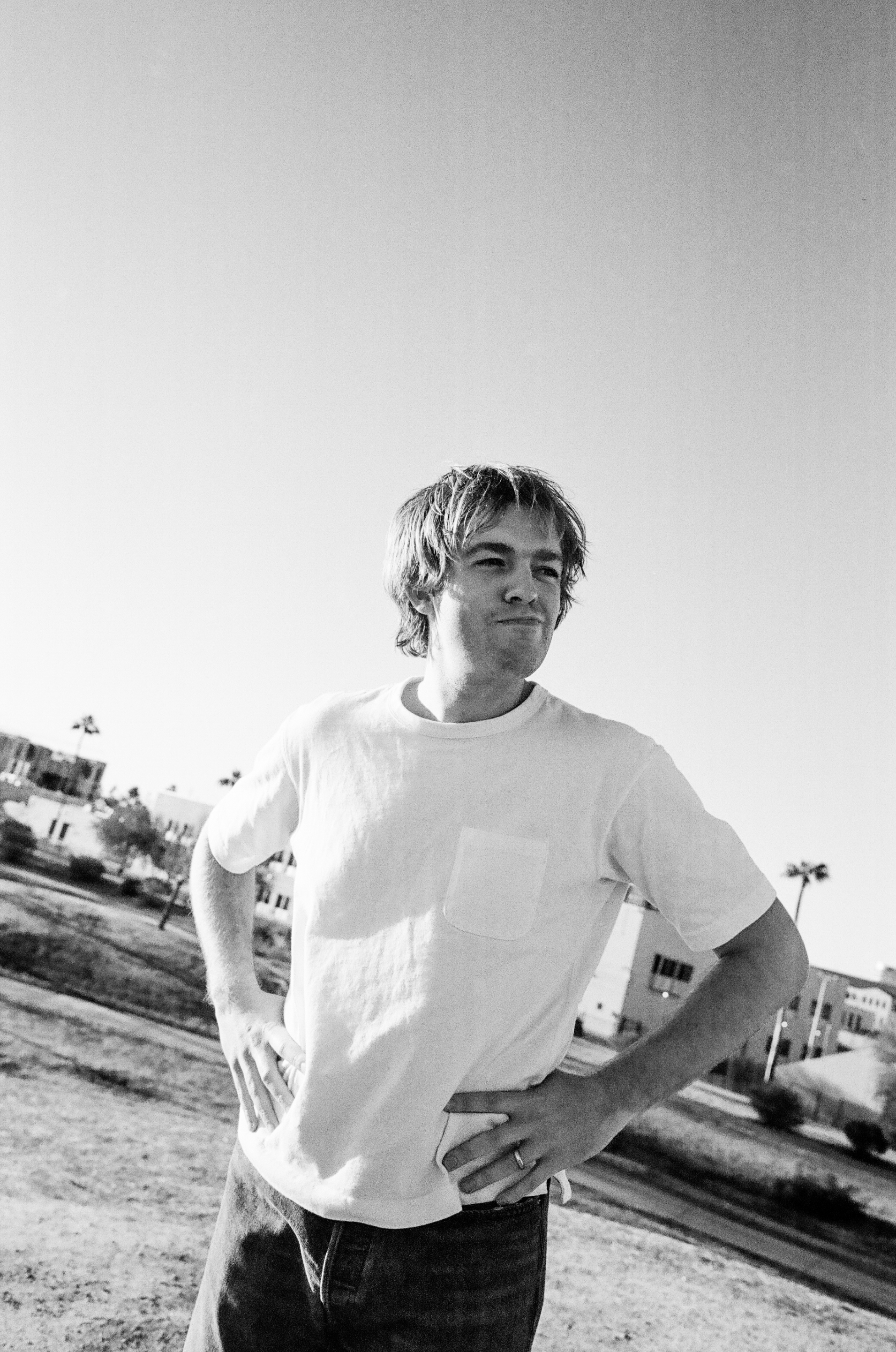
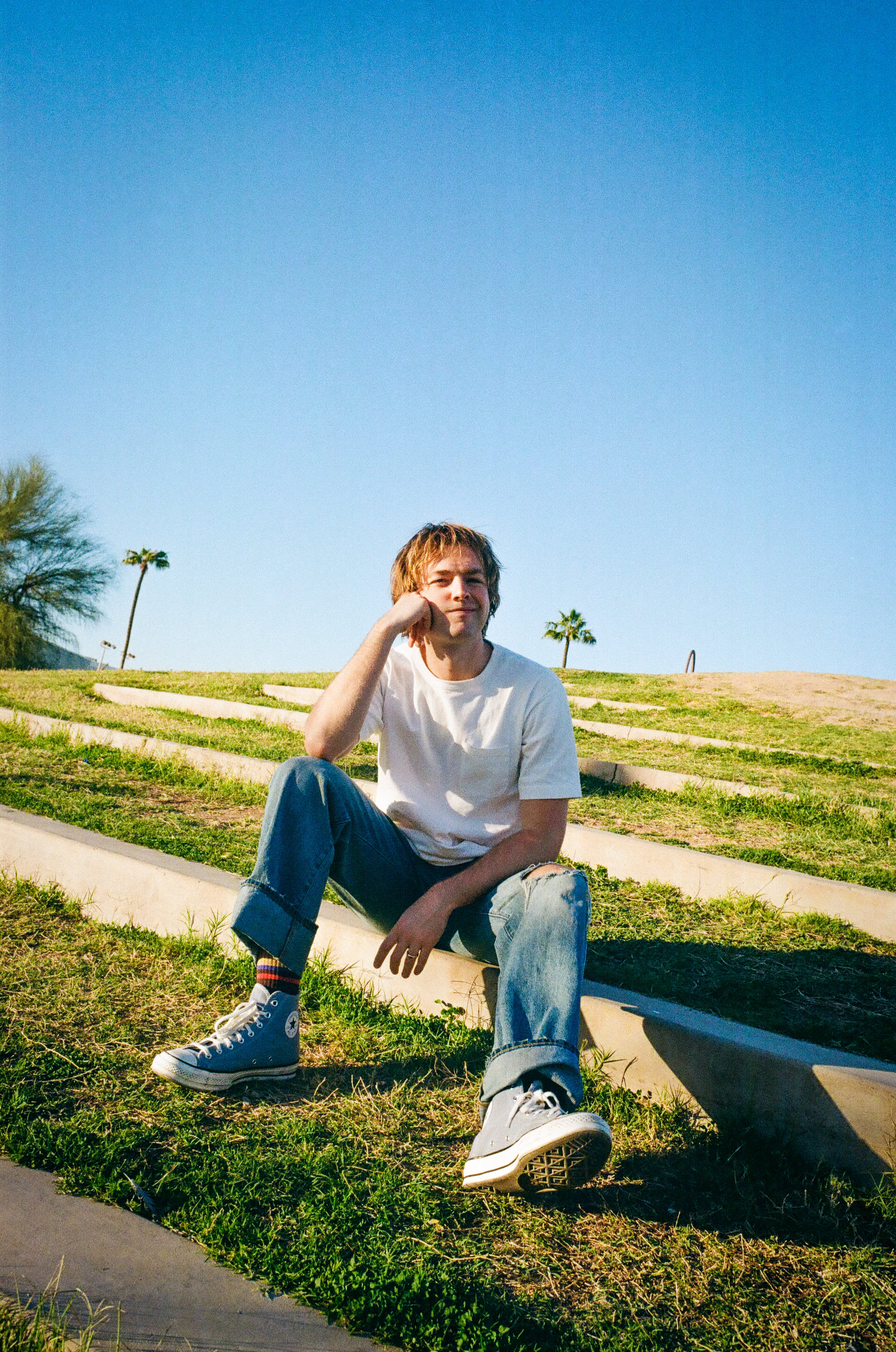
Stay informed on our latest news!







So why this band, and why now? What has resonated so deeply? As I learned, julie's three members — Alexandria Elizabeth (vocals and bass), Keyan Pourzand (vocals and guitar), and Dillon Lee (drums) — control nearly every aspect of their creative vision. Though all in their early 20s, they boast an impressive range of skills. A glance at their side projects and Tumblrs reveals their diverse artistic interests, spanning collage work, graphic design, poetry, architecture, and more. During our conversation, julie explained how they maintain full control over their albums — from crafting the sonic palette to making the album art, choosing collaborators, and directing their own videos. It’s a crash course in authentic creation, blending music history and the avant-garde with virality and mainstream success. Read my full interview with them below.
office— What is the last dream you remember vividly that stuck with you?
Alexandria Elizabeth— Gosh. I wrote this down. It was on tour. Okay, so I threw a party at my mom's house — my childhood house. A lot of people came, and it was really crazy. The house got destroyed, and the entire back wall was blown off. When my mom came home, she wasn’t mad, but she was really matter-of-fact. She said, "Bro, don’t throw parties here because you always end up blowing off the back wall." And I was like, "What the heck?" It was so strange because I blacked out between the party ending and my mom arriving. I wasn’t super guilty, though, because she wasn’t upset, just... practical about it.
Do you guys think dreams have unconscious meaning?
Dillon Lee— I think they definitely do.
AE— I was just reading Carl Jung on dreams during this tour.
DL— I keep having these recurring stress dreams where we're setting up for a show, but it takes forever to set up my drums, and the crowd is just waiting there. It’s so slow, and everything is delayed. I also get bug stress dreams, where oversized bugs are chasing me. It's pretty gross.
How did you guys all meet?
DL— Keyan and I went to high school together. We became friends through a mutual connection, and we started playing music together in my kitchen, just messing around. We both had similar interests in music. Then we met Alex.
AE— I saw Dillon around the Orange County scene. He dressed really sick and stood out. We had mutual friends, and he played in one of my friend's bands for a while. I didn’t know about Keyan until Dillon DM'd me like, "Wanna be in my band?" I was like, "Okay." I met Keyan when I came to his house, and he helped me get my bass out of the car. I remember thinking, "Oh, they’re so cool."
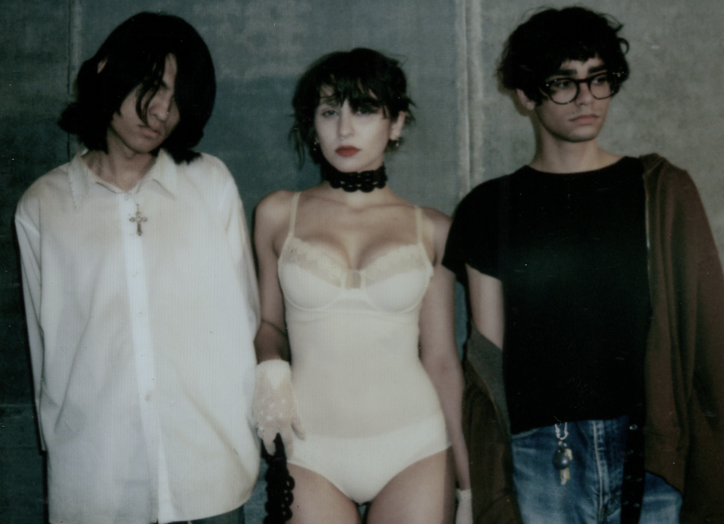
How have you grown as friends and as a band in the past couple of years?
Keyan Pourzand— It went from best friends to family. We’re like siblings.
AE— We're all really annoying all the time.
KZ— For better and for worse. We'll argue with each other like crazy. And then we'll make up five hours later.
DL— Sometimes it means nothing because it's just arguing with your sister.
Do you guys fight about stupid shit, or like “Oh, I don't think we should put that much reverb on this.”
DL— Stupid shit. And then also, well, that's [reverb] also kind of stupid shit.
AE— I remember at the boxing ring before we played we really got into it about Dillon's drum kit and whether it should be five inches forward or back. And for some reason we were really pissed. We were all fighting.
KZ— I was like, bro, why'd you do that? I put the amps back there for reason.
DL— And I was like, whatever.
AE— And then I was mediating it.
When it comes to your stage presence, is it planned, does it come naturally?
AE— Mostly natural.
DL— We definitely do talk about performing on stage and try to be intentional with it. It's not like it's choreographed when we play the show, all of that's in the moment, but we do think about how we set up the amps on stage and such.
As artists, how much do you want to communicate with the audience? I've seen performers that don't say a thing to the audience, and then others that are yappers. They're doing crowd work. It's like standup for them.
AE— It's not in me. I can't work a crowd in a comedic way. I can sing though.
Do you improvise on stage?
AE— We'll extend certain songs or in between the songs we'll do these interludes and play off each other's noise. We’re pretty much making soundscapes.
DL— Most of the improvisation comes from in-between the songs when we have samplers playing. And then just trying to play with whatever we're hearing mixed with our instruments in a very minimalist way.
Dillon, have you always drawn, and when did you start?
DL— I've been drawing since I was three or four years old. When my mom was my age, she went to art school and she would always have her drawings hanging up. Originally that's what I wanted to do as a career at first because my mom got me the Gorillaz's Demon Days CD and I thought those characters were so sick. I wanted to make people's album covers for a living.
When did you first doodle the character in the cover art?
DL— When I created the first Macy drawing, I was in my English class in high school and wasn't doing it intentionally. I didn't think, This is going to be for my band.
AE— Our friend was always like, Bro, she's so fire.
DL— In a vague sense, this girl seemed like a highly appropriate representation for what I wanted to communicate at the time. Eventually we used it for a lot of art when we first started putting out music and then it became pretty seamless.
Do your other disciplines and artistic mediums, like your architecture studies, influence your song structure?
KZ— A lot of what you're taught in architecture school is balance in structure; how to carefully craft the composition of what you're creating.
AE— In art design and music theory in general, which is what I was formally educated in, a big thing is the idea of a repeating thematic element that recurs throughout a piece of work. We talk about that when designing buildings, but it’s also very common in music, like when there's a certain melody or theme that keeps coming back.
KZ— That's how you make a song!
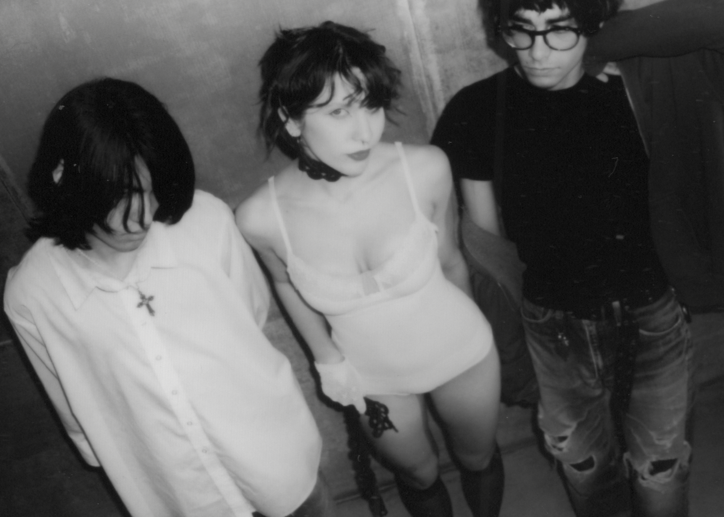
I noticed that the song structures on the new record are really varied.
DL— Yeah, that was intentional. I think it's interesting when I listen to certain music and the song structure feels like this rollercoaster, but it also doesn't feel like it's just getting away from you or falling apart. I like when it's done in a good way, and it goes to a lot of different places, but still feels congealed into this singular thing. We wanted to play with that.
Let's talk about "Feminine Adornment". It's one of the only ones on the record that’s just Alex singing. What does the title represent?
AE— The title was an excerpt. I was reading Anti-Oedipus by [Giles] Deleuze. It was a random quote that I really liked — it was actually the full title before. Throughout my life, I’ve played with masculinity and androgyny in my fashion and how I portray myself. But recently, I went through a phase where I was drawn back to femininity after a year of avoiding makeup or anything feminine. Doing those things brought me a sense of peace. It wasn’t about trying to achieve femininity but about self-soothing. I found myself reaching for feminine textiles, sewing, creating things, makeup — those processes became comforting. I wish I could find the full quote.
It'd be cool if you did the Fiona Apple thing and made the title a giant poem.
AE— I would love that vibe.
You've mentioned that image branding and music hold equal importance for you. Do you think this ever detracts from the music and artistry itself? And does it affect your creative process?
KZ— No, it just takes longer for us. That's why our timeline—besides the fact that we were in architecture school — takes so long. We're making music and art simultaneously, putting equal effort into both.
Do you think about how to package and present it before, during, or after creating the music?
KZ— During.
DL— Yeah, definitely during. Like Keyan said, that’s part of why it takes so long. Everything is really thought through. Perception, image branding, all of that is important. We don't want to be misrepresented.
Would you ever hand the reins off to a director, filmmaker, or artist, or do you want to control every aspect of your image?
KZ— We try to maintain as much control as possible, but sometimes we work with others because we don't...
AE— ...have the bandwidth to do everything ourselves.
DL— There are a few photographers, videographers, and creatives we connect with, where we understand each other.
Keyan, you've mentioned you started playing music as a stress relief. Now that the band is scaling up and becoming your job, do you worry it might become a source of stress?
KZ— That's funny. It has been a source of stress for four years now. It's strange, honestly. I started playing guitar to relieve stress, but now it's part of the stress, but that doesn't stop me from playing guitar to relieve that same stress. It's a cycle. I'll get stressed, start playing guitar to relax, but then I'll shift into writing, which stresses me out, so I put the guitar down, and then later pick it back up to release stress again. It's very weird.
Do you find that stress relief shifts into other mediums where there's less pressure, like side projects that don’t have as big of a spotlight?
KZ— Yeah, definitely. I spend a lot of time working with electronics and making weird little sculptures out of scrap metal and odd things like that. I do a lot of graphic design too, and we all work on the band's artwork together. I’m always on the computer with Photoshop, working on album covers or posters. It's all about shifting gears whenever I can, so I'm not constantly freaking out.
Touring with famous people sounds stressful.
AE— Power outage, amp on fire.
Wait, what happened?
KZ— We were playing our last show with Faye Webster, and midway through a song, people started raising their arms. I was confused, thinking, "Why is everyone’s hands up?" Then I turned around, and my amp was on fire. I was like, "Oh, okay."
AE— That was pretty alarming. But fun. Then we were like, "Okay, I guess we should play the song now."
DL— We put out the fire and just kept playing. It was actually pretty fun. Then, the other day in Boulder, Colorado, just before we were about to start, the power went out. We were all in the green room, and at first, it was funny. Then it became, "Oh no, what if we can’t play?" because the line outside wrapped around the corner.
KZ— People camped out for three hours. Only a few left, which was shocking and really sweet to see.
AE— They were just about to refund everyone.
DL— The venue staff came in and said, "Okay, guys, we’re probably going to call it quits. The power won’t come back in time." We were accepting defeat and started packing up.
KZ— I was literally packing my suitcase.
DL— Then the lights came back on, and we had to switch from packing up to getting ready to play the show.
KZ— It turned out to be an amazing show. Super packed with a lot of moshing. It was wild.
AE— It really touched my heart that the people of Boulder, Colorado stuck around for us.
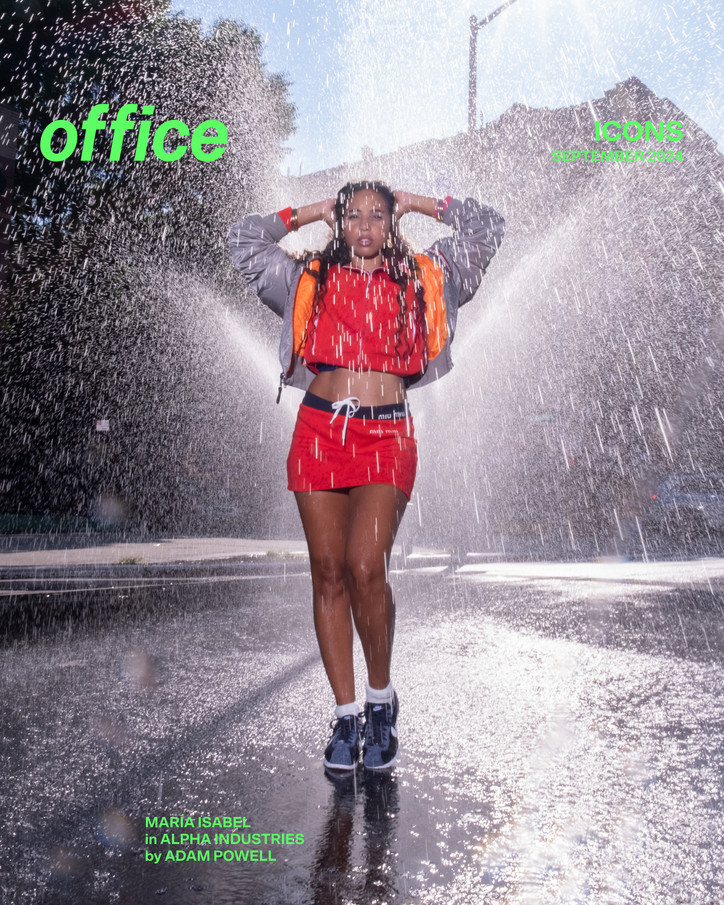
MARIA wears JACKET by ALPHA INDUSTRIES, TOP and SKIRT by MIU MIU, SHOES by NIKE, SOCKS stylist's own
Calling in from a sunny Los Angeles, María reflects on how much she’s changed since releasing her first two projects, her 2020 EP Stuck in the Sky and 2021’s i hope you’re very unhappy without me—reflections on love, loss, and long-distance relationships, which immediately drew attention for their introspective lyricism and bilingual fluidity. "A lot of the time, I get messages from listeners saying they found a song at a really hard time, and it helped them get through something. Even with my first EP, which was all about long-distance heartbreak, people have told me that it resonated with them in the same way," she muses on the emotional resonance of her previous projects and her thought process as she works on the next.
"I feel like I’m letting go of things I had envisioned for a long time, but in a way that’s been positive," she continues. "Loss and change are hard, but I feel lighter, and I’m a better version of myself now." The lessons she’s learned, she explains, continue to ripple through others. "That’s the most gratifying feeling—knowing my work isn’t just for me, but that it can help at least one other person."
Read our interview below.
Before becoming a full-fledged musician, you were a poet. What inspired the shift to pursue music full-time?
They were always separate loves for me. Writing felt natural because I loved reading, and it was my first way of expressing myself and I grew up singing, whether in talent shows or my church choir — but always singing other people’s songs. It's funny looking back because I don't know why it took me until adulthood to connect the two.
After college, I realized music was what I really wanted to do, and that I wanted to sing my own words. Going to the studio helped me take what I'd been writing for years and put music to it. That's when the two finally made sense for me.
Do you remember the first song you ever wrote?
I do, I’d there are two "first" songs. Technically, the first was when I was five. I got stuck on a line, "Won't you get out of my dreams?" and I just repeated that for two minutes. I was really proud of it at the time. As an adult, the first song I wrote was for a songwriting class — it definitely wasn't great, but it was a key moment. I just took one of my poems and played simple piano chords under it for the class, which was my first time connecting the two in front of people.
Are there any daily rituals that you’ve followed since then?
Yeah. I have two daily rituals: calling my mom and hitting my snooze button at least twice when I wake up in the morning. [Laughs].
What’s the biggest lesson you were taught that still rings true to you today?
I think the biggest lesson I was taught is “closed mouths don’t get fed.” You have to ask for what you want, no one knows otherwise.
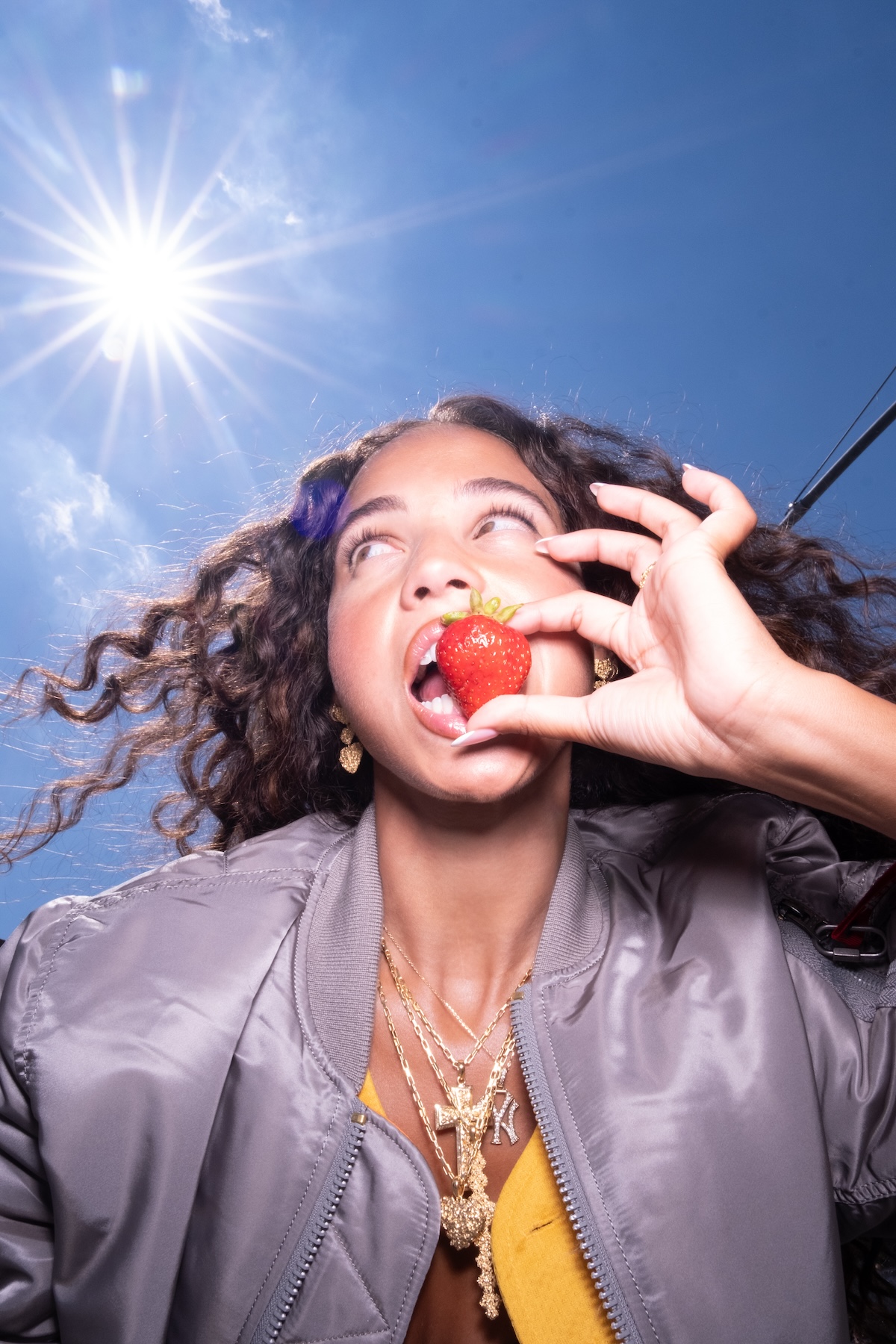
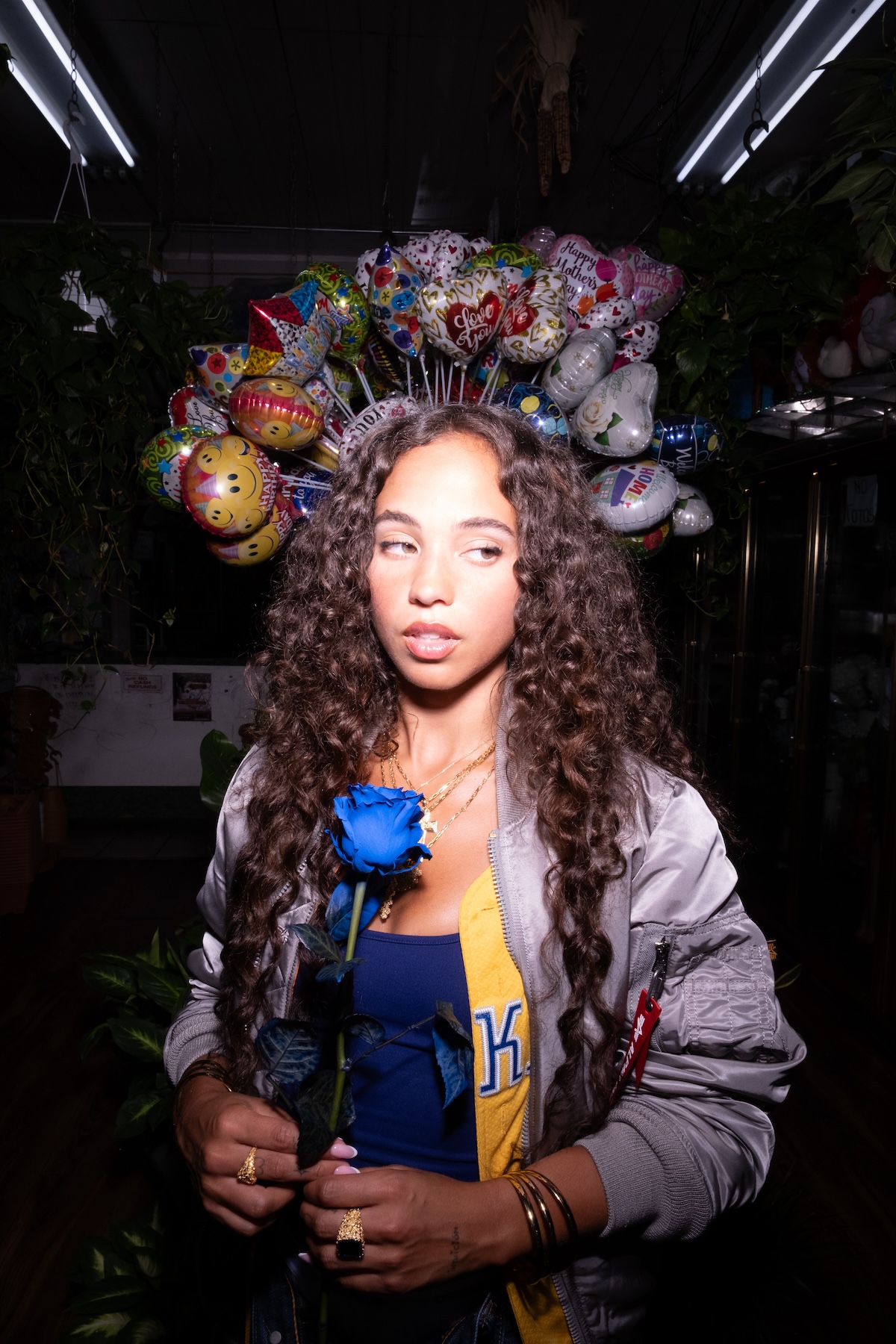
The lyrics in your songs feel very emotionally charged. Do you consider yourself an emotional person?
I'm definitely an emotional person, which is what really spearheaded my interest to write in the first place. At first, it was an outlet for negative emotions, so a lot of my early songs were slow and a bit sad because that's what I was drawing from. That’s changed as I’ve grown. Now, I try to pull from the full spectrum of my emotions. Whether I’m experimenting with genres or themes, I just want to sing about what I know and what I’m going through. It’s been fun to evolve that over time.
I'm just like, Girl, what the fuck were you so sad about? But also... real. I feel like everyone's depression peaks during that time in your life — when you’re like 19, 20 years old. Now I'm like, There's so much more to life. Looking back, it still means a lot to me and I'm grateful other people can find those songs but I've definitely outgrown that way of thinking.
Do you have any role models or artists you look up to?
Absolutely. Alicia Keys was a big one for me. I still think "If I Ain't Got You" is one of the best songs ever written, listening to it for the first time made me want to create something that would evoke that kind of feeling in someone else. I also think her being so New York and quintessential to my experience growing up in the city is definitely part of it. The Diary of Alicia Keys was one of the first albums I really got stuck on and played forever. Lauryn Hill is a big one too. I also always go back to Amy Winehouse — how honest and vulnerable she is in her songwriting really meant a lot to me growing up.
What’s been your proudest career moment so far?
That’s hard, but I’d probably say Colors was a big one for me. I had been watching for a while and discovered so many people there, and I really started my career as Covid-19 took over so a lot of what was happening for me was only online and not all tangible up until that point. Recording that moment live and seeing it come out to an audience bigger than my own was really great.
In the same vein, going on my first headline tour. It was probably the New York stop at Baby’s All Right. There were two sold out nights and my entire family was there, even people I’d grown up with that I didn’t really know came out so it was such a full circle moment, being from New York and really feeling that support where I’m from.
A lot of your songs are bilingual — did you grow up learning both English and Spanish simultaneously, or was one your first language? Do you consider yourself a true heritage speaker?
Spanish was my first language just because both of my parents are from the Dominican Republic, and although my parents were already living in New York when they had me, we went back and forth a lot as they started to lay their roots in the city. I also grew up with my grandparents and aunts and uncles, but my parents’ English was pretty advanced compared to everyone else so English came right after. I don’t remember a time when there wasn’t both. I’m definitely a heritage speaker but it’s so funny — I see all these memes that are like “being bilingual means you’re just bad at two languages,” and it starts to feel like that after a while.
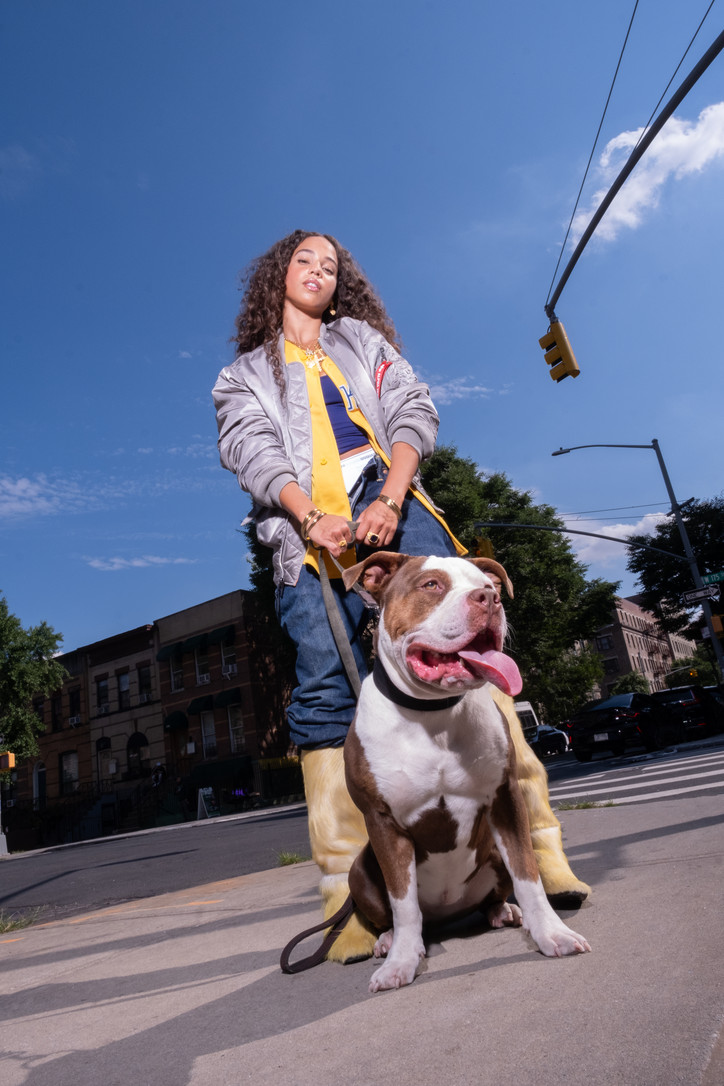
How is it visiting DR now?
I was just there actually. My parents had been out there for a few weeks and both of my mom’s parents and dad’s mom are still in DR so we just hung out with them for a while. I think so much of why I love the Dominican Republic is that, while everywhere changes, the rate of change there is so much slower than in America.
I’m 28 now so it’s different from when I was 4 and living there, but it still feels like you’re going back in time and to a simpler way of living. I used to hate it as a kid, because that’s when everyone started having phones so I’d go and never have service and be annoyed. But now I go back and I’m like, This is incredible, no one can reach me. I’m going to sit in this rocking chair for hours.
Do you have a similar experience when you visit Corona now that you’re living in LA? Has the neighborhood changed much?
It’s actually kind of similar to going to DR in that way. It’s definitely changing — I was jarred the first time I saw a Starbucks pop up — but I feel like it’s still much slower than other parts of NYC.
What’s your favorite spot in Corona?
My favorite spot in Corona — well in New York really — is probably Flushing Meadow Park. Growing up, that's where all the family barbecues, events, and birthdays were. If my parents had a day off from work that’s where we’d go to hang out. Growing up going to Mets games and working at the US Open, that was the center of my world for a lot of my childhood.
Do your early experiences getting together with family in the city inform your approach to shows and performances as an artist?
Yeah, a hundred percent. It’s funny you say that because I saw a post on Twitter yesterday of a group of people watching an MMA fight on a projector on a street in Brooklyn. I just feel like you don't see that anywhere else unless it's a planned event — it’s such a New York thing. That’s why performing at Baby’s was such a pivotal moment for me. I want to feel connected to everyone when I’m performing live, talk in between songs and interact with the crowd in a way that’s genuine and it was easy to do that there.
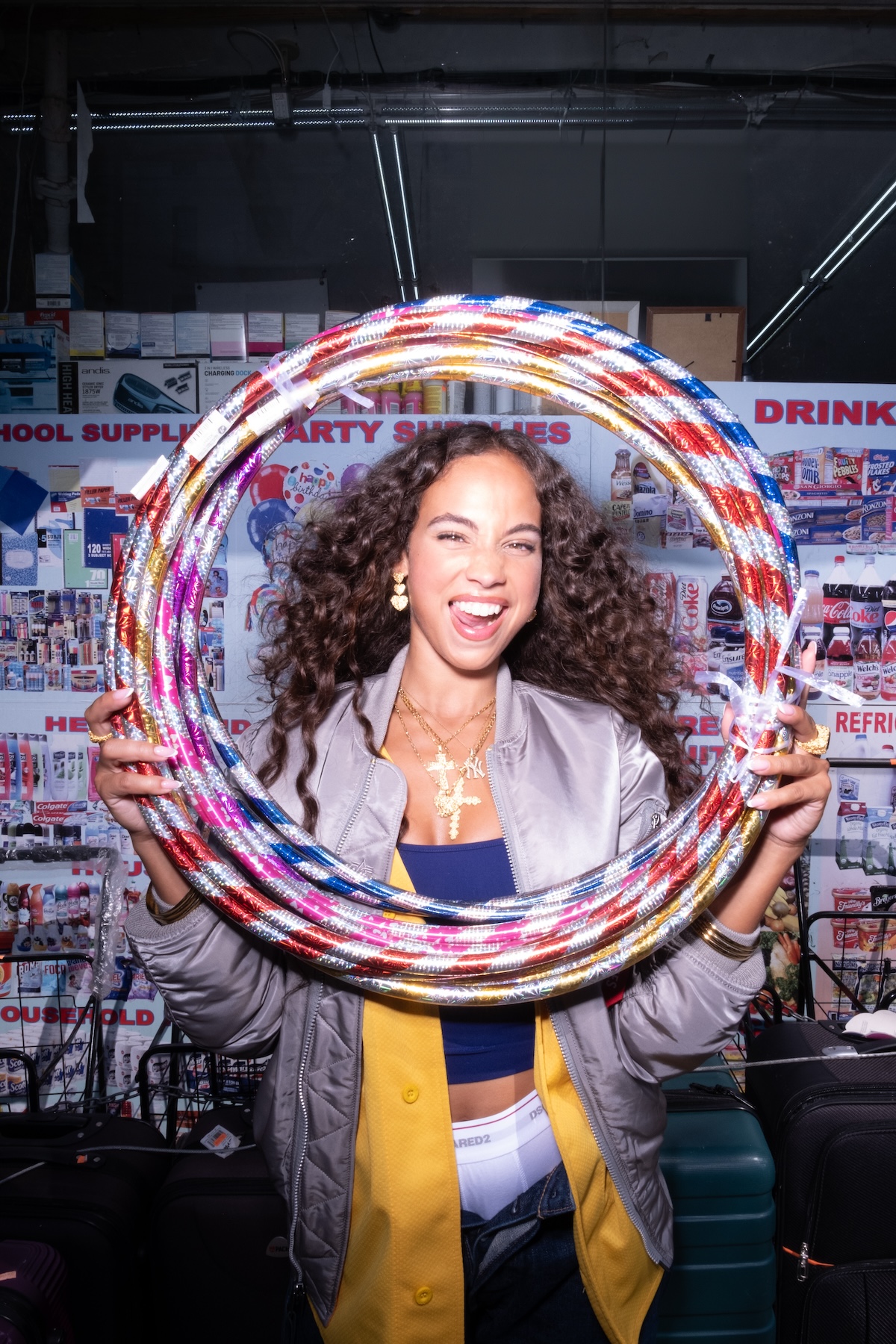
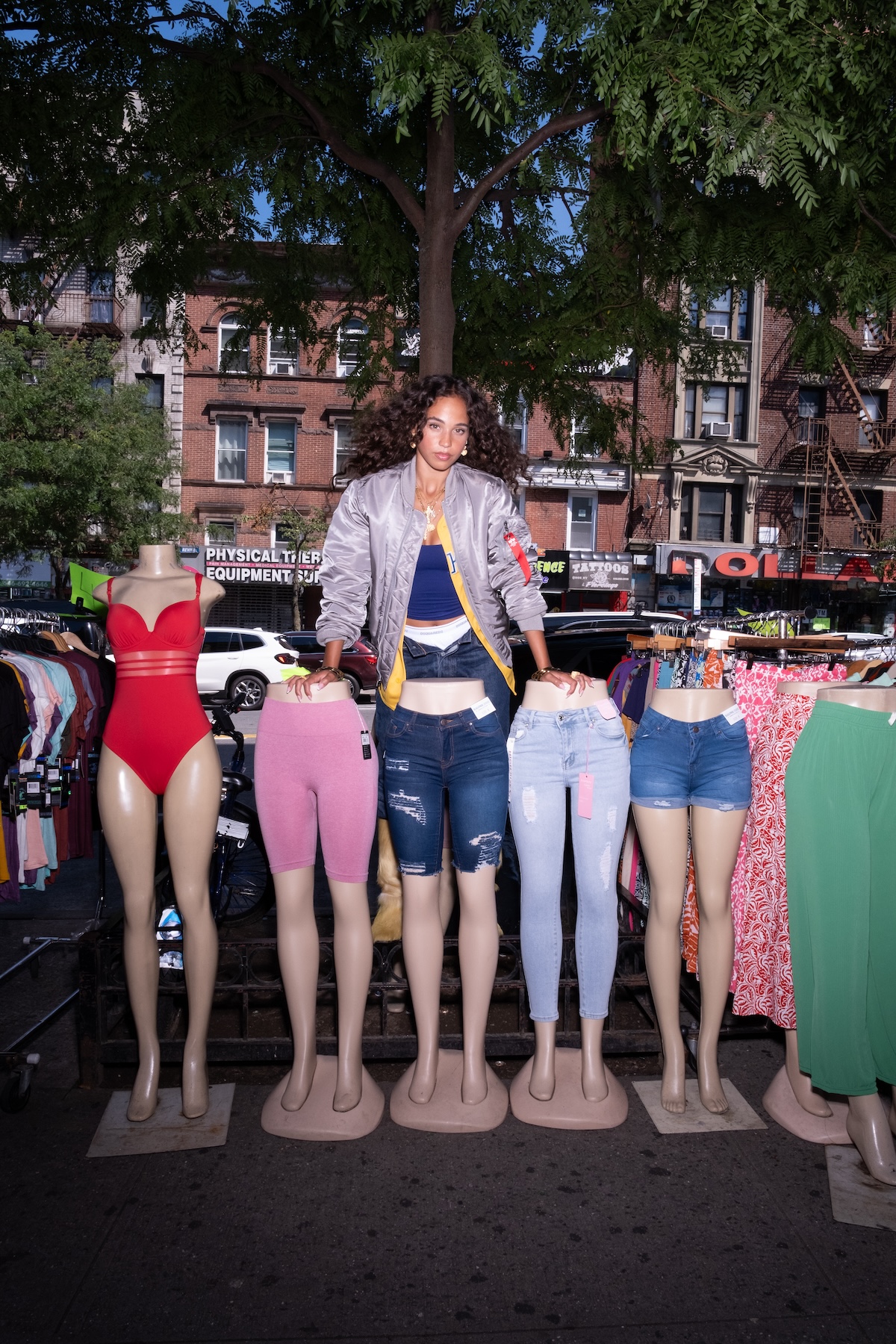
Do you ever feel a tension between creating things for yourself and trying to make it in the industry, especially with the focus on virality and algorithmic songs?
Totally. There’s this balance between singing being how I make a living and it also being something that I consider sacred and I want it to remain that way always. My reminder to myself is basically what we were talking about before, being able to go back to a Lauryn Hill classic or something similar.
I also feel like people are tired of the bullshit already. It feels like we’re reverting to that authentic way of creating. This generation is good at seeing through what’s fed to us. For me, it connects when it’s genuine and I know that’s what’s gotten me this far.
How often are you in the studio these days anyway? Are you working on anything you’re excited about?
I have been in the studio a lot. From a listener's perspective it must feel like so long since I’ve released music, and honestly, it feels long to me too, but I’m having so much fun just trying new things and I can't wait to share.
It’s also been so nice to just live my current life and to have all of these new experiences to draw from — when you’re dropping a project, going on tour, doing interviews, you don’t really have time for that. I feel like I've lived a new lifetime in the last year or two.
Where are you finding inspiration currently in this new chapter or this particular chapter of your life?
A lot of reading and watching a million things. The last book I finished was The Year of Magical Thinking by Joan Didion. It’s so heartbreaking, I was like sobbing over this book. I had no idea what I was getting myself into. And she’s an incredible writer.
And I feel so similar now. What used to feel like the end of the world to me just doesn’t anymore. I’ve been going through all of my experiences with that mindset. The way she goes through those things and keeps living. I know I have to keep living mine until the end.
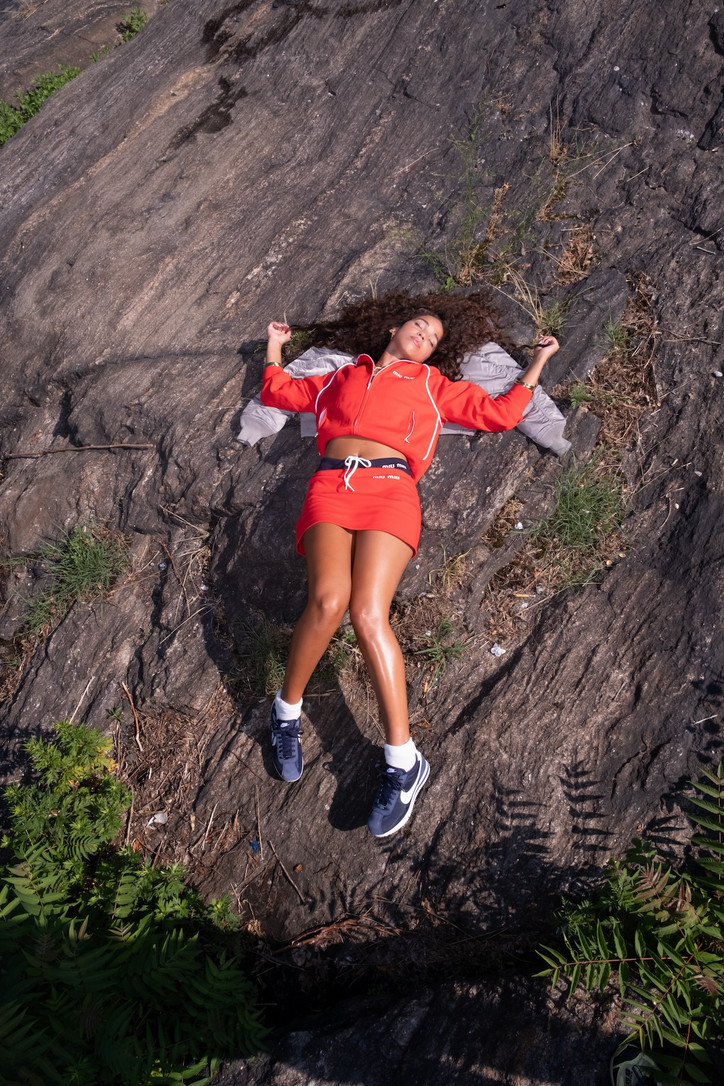
What are you most looking forward to in this chapter you’re entering now?
On the career side, getting to share the new music and figuring out how I want to do that. In a personal sense, new experiences and new people. I know I’m still grieving things, but I have a much easier time letting things go. I understand that people are in my life for a reason, and things just can’t last forever. It’s impossible. It’s funny too because I used to be that kid that was like, You’re my best friend, you can’t go anywhere, I can’t do anything without you, so a lot has changed.
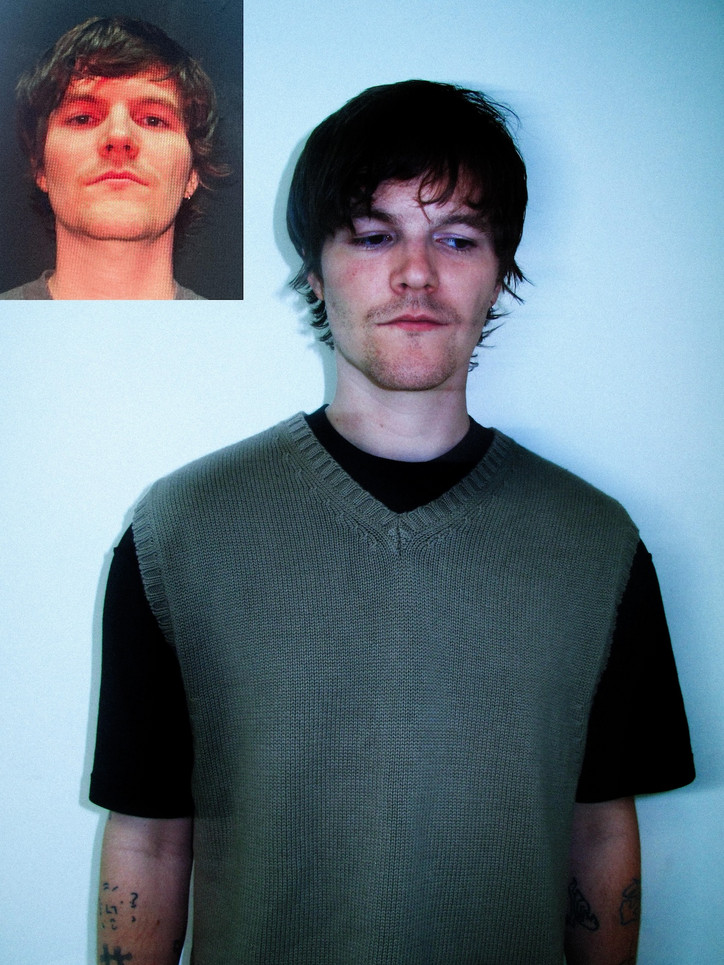
Although the band has received critical acclaim and praise for the recordings themselves, Chanel Beads' immersive performances are in a lane of their own, offering re-worked tracks that take on a whole new life and sound onstage with Shane’s spirited act alongside frequent collaborators Maya McGrory (on vocals & guitar), and Zachary Paul (violin). As of late, Chanel Beads has been on a tear, beating the ‘Dimes Square and Nolita-scene band’ allegations to a pulp with can’t-miss shows. Playing coast to coast and overseas, the band just played another round of shows in the UK before returning to New York ahead of the North American leg of their tour.
Fresh off his return flight from across the pond back to his home in Brooklyn, Shane sat down with office to unravel his unique creative process informed by two "F's" (feeling & function), the drawbacks of performing in caves, and the complicated, toxic relationship artists have with suits, algorithms and streaming platforms like Spotify.
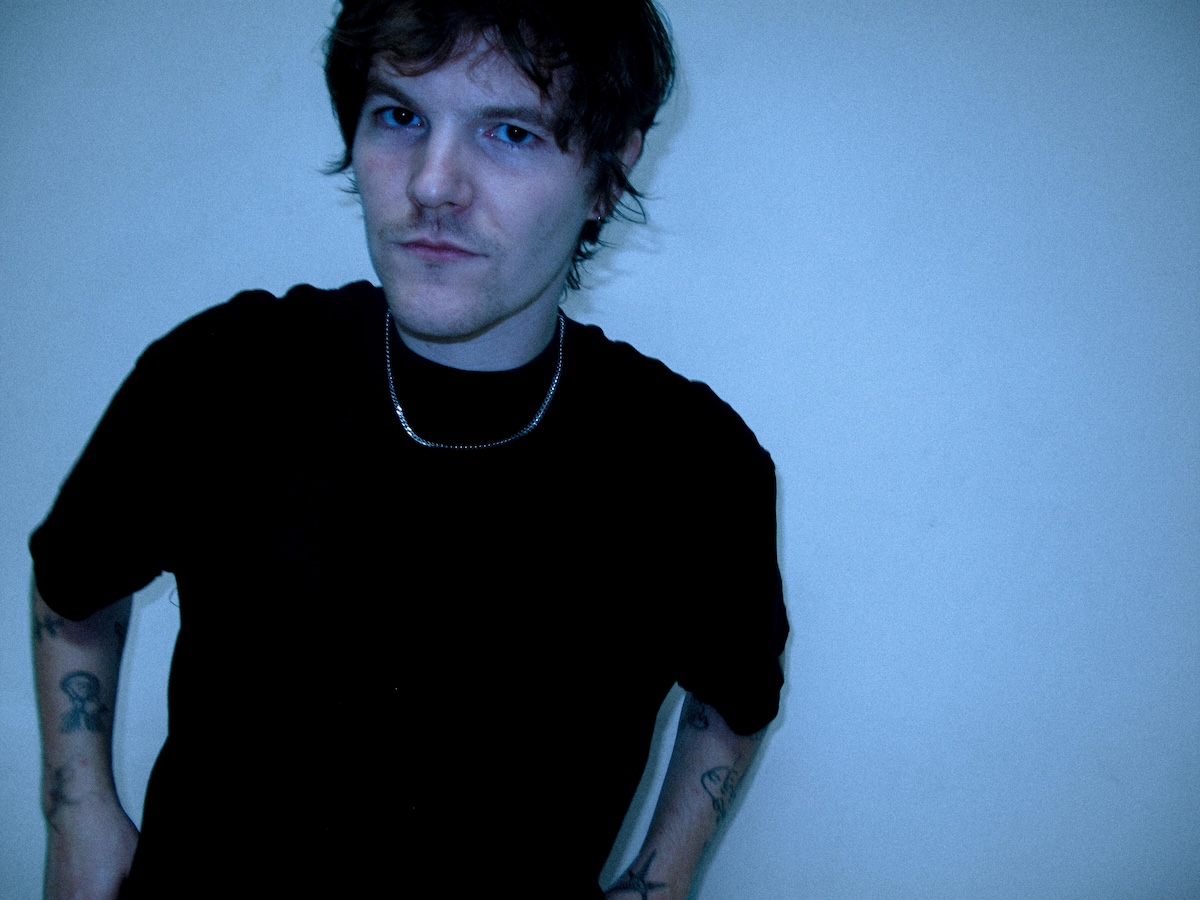
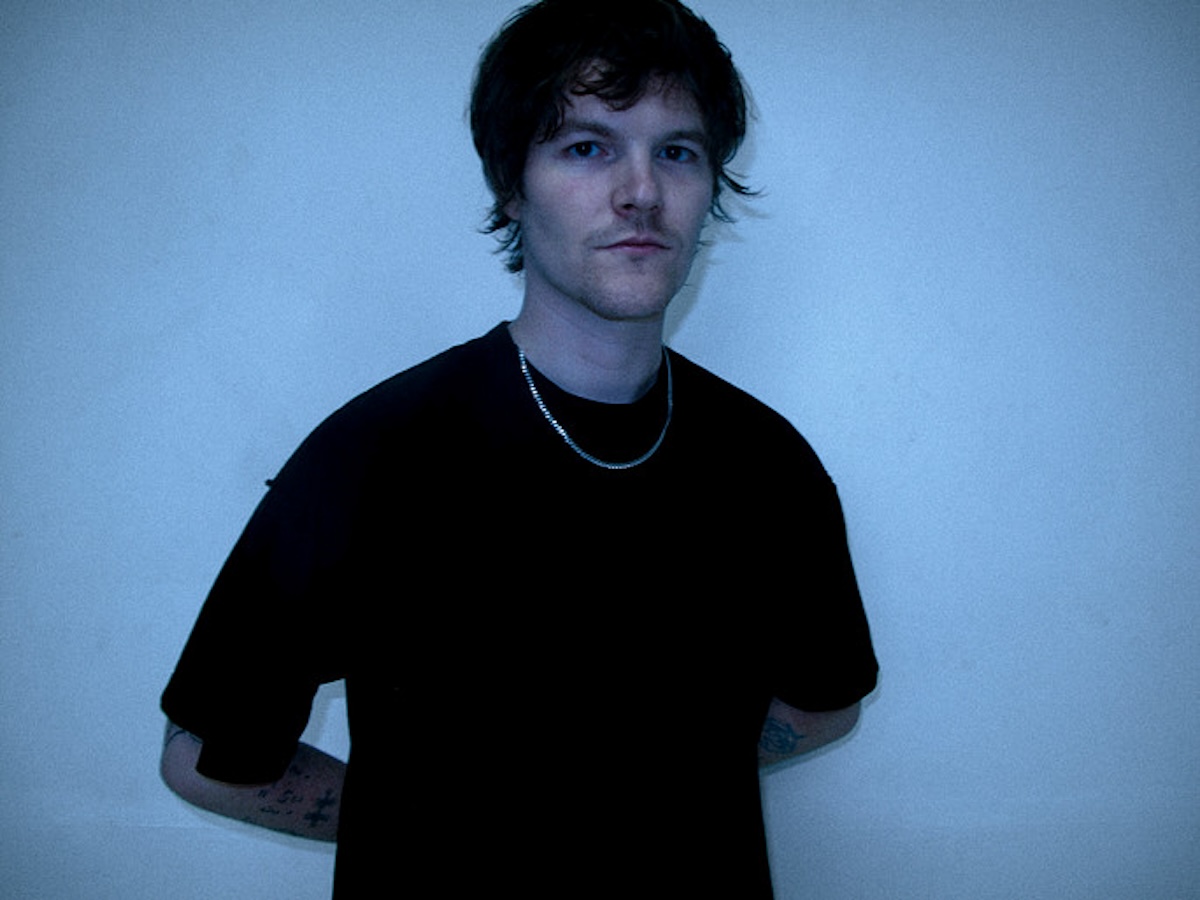
Jack Kissane— My introduction to Chanel Beads was through word of mouth from a friend, which — in my opinion — is kind of the most organic way to discover music. I read that in a past interview, you threw a stray at the Spotify algorithm and the machine that it is. Can you expand on your thoughts about having your music found organically versus the algorithm just pushing it? And have you noticed a huge shift in who attends your shows since "EF" went nuclear?
Shane Lavers— Yeah, definitely. When we were in the uk, there were definitely some really sweet younger people that I think kind of got it from algorithmic stuff or whatever. But I don't know, I obviously have lots of thoughts and things to say [about Spotify], but yeah, you can't really control it, and sometimes I'm worried that the little balloon I was trying to blow up has already popped or something because I feel like my favorite experience with music is kind of more of a private one. And so it’s kind of sad to feel like people encounter it in a way that doesn't feel like it's just theirs. I'd rather have people listen to the music and feel like they're kind of alone with it in a sense. Or they can bring what they want and take what they want from it, or they have ownership over the music because all my favorite stuff, I feel like I have a personal relationship with it or that I have something to say to it and has something to say to me. So yeah, I mean, Spotify is so fucking stupid too. As a business model and everything. It's just brought an untold amount of rot into the music business world, but at the same time, it's so sick to be able to listen to whatever you want. And I guess the one positive thing I'll say about Spotify – but it's not unique to just Spotify – is that through related artists and stuff like that, there's just so much. And then seeing other people post public podcasts or playlists, you can do so much fun music discovery.
Yeah, I guess there are two sides to the coin with that, but I definitely feel you with the personal experience though, like the things I come across organically, just hit differently. Nothing beats randomly stumbling across a sick opener at a random show, because then you have that in-person experience and can attach that artist to a certain moment in time versus listening to an album and then a random song popping up after it on shuffle. Which is still chill, but it’s still fuck Spotify.
Yeah, I don't really know how I feel about algorithmic stuff because for XY reasons, Fuck Spotify, but I think I don't really have a problem with how you come across it so much as if it actually engages with you.
I feel like I get fed a lot of nonsense most of the time, but hey, I mean, we're in the AI era of society now.
Yeah, with your job you're probably more interested in music discovery than I am too. I actually don't really engage. I don't really need to use algorithmic or curatorial music stuff very much. I guess I'm not very conscious of how I'm encountering music these days.
Do you listen to a lot of music now? I mean, I talk to artists and a lot of them say that they're so invested in their own work that it kind of becomes all-consuming and listening to other music can get in the way of original creative thoughts. Do you ever find that to be the case, or are you just completely open to how you listen to music?
I'm pretty open. I've never been like, ‘Oh, I need to work on my album or sound so I need to hermetically seal myself off from influences.’ When I'm working on music, I never don't want to hear something because of the way It will affect the way I'm making music. Because my approach to a lot of the music that I make is based on a feeling. It's not really approaching it with a, ‘Oh, here's a vibe or a sound I want to create,’ so much as it’s more ‘Here's a feeling I want to convey.’ And so as much as anybody will try to rip something off, I won't make a song or finish it or want to put it out unless it's starting from an intellectual or emotional feeling of mine and feel that music is the route to convey it rather than the other way around.
I only ask that because I feel like a lot of the music you make feels self-referential vs. sounding like anything else that I've ever heard. For the past few months, your music has been the coolest stuff to put my friends onto because of how unique it feels. It’s just hard to put a label on it. I am sure you've seen articles trying to put a name to your sound.
Yeah, it's funny. I remember seeing this word when I was really young, and now it’s coming up for my music. Hypnogogic pop or something. So it's kind of funny. I always thought that was not a genre. I don't think of my music as dreamy at all or dreamlike or surreal. So it's kind of funny that people kind of attach those themes to it. My approach just feels kind of like making folk music or just making a folk song. But it's like we make it on the computer, and we don't really have a studio to go to, so it's just like however you can assemble it in kind of an impatient way. I collaborate a lot with Maya [McGrory] and Zach [Paul], and there is kind of this thing of like, ‘Hey, are you free today to help?’ Like I have an idea for maybe a string thing Zach can do, and if he's not free, I'm not going to sit on my thumbs, I'm just going to work on it myself. And then sometimes I'll be like, ‘I like it, this works.’ So with genre and stuff like that, it's just the making of the music to match a feeling. It's just a functional process. Like, I'm feeling this emotion and I want to work on it. That also relates to why I would never be like, ‘Oh, I'm not going to listen to music right now because I’m working on my own stuff.’ Because it's like there's no conscious effort to marry what I'm listening to, to what I'm working on. Because the thing that I'm working on is what I have in front of me. Like we just bought a cello. I dunno, just whatever's there, it's very functional and it's very problem solving in a way. To me it feels like a little unrelated to a certain genre.
Definitely, and you bringing up that functional point makes a lot of sense because I love how you marry synthetic and acoustic instruments together. And it especially comes out in your live show performances. I've seen some of the recorded live performances and at times the songs sound almost completely different than how they do on DSPs. Have you ever performed a song and thought, ‘damn, I wish we recorded it initially and published it that way?’
Yeah, I mean, the way we perform some of the songs kind of leads back to my point about functionality in that it's not really a choice of, ‘Oh, how do I make acoustic autotune music?’ It's just like, you can move quicker with autotune. I can focus on different things than I normally would if I didn't have the autotune on or something like that. And also, I don't use autotune all the time. I feel like people talk about a song thinking it has autotune when it doesn't.
Yeah, because you can sing with a pretty high register just by yourself, right?
With a microphone, you can sing quietly and higher than you can at a show. I feel like at a show, I'd much rather reach those notes by kind of screaming it or yelling it. Man, it's funny, I'm always self-conscious if we're just playing the songs too close to how they're recorded a little bit. But there's a bunch of music where I'm like, if I go back and listen to the recording, I'm like, ‘Oh, this is almost way more wimpy than I thought it was from the way that we've been playing it.’ And I'm kind of like, ‘Oh yeah, I wish I could have brought more intensity to stuff.’ But at the same time, maybe some artists just operate from what kind of music they want to make or something. And I always feel a little bit annoyed in that I feel very limited in what I can do musically in terms of what I feel motivated to finish. I feel like I don't really have enough decision making in my own music because of the functionality of it. It's like it works or it doesn't work to me. And so it just comes out how it comes out. And it's like if I want to make an intense song, I have no idea if it'll come out intense or not. Same thing if I want to make a high energy song or not. I can't really tell if I'm going to end up coming up with one at the end of the night or whatever. Sometimes I start with a high intensity song, but then it turns into this mellower or stranger thing, or vice versa where it's like, I'm trying to stretch something out into this more ambient thing, and then it just comes out totally different. Sometimes it feels like decisions weren't made along the way, even though technically you are making them. It’s more just deciding if something is working or not. It's like if you're tinkering with something and you don't look up and all of a sudden hours have passed and it's totally different from what you thought it was intially. You didn't really feel like you made what it’s in front of you it kind of just took its own shape that way.
Yeah, sometimes it feels like things just take their own course. When I'm writing, sometimes I go in with a certain perspective and things just change along the way, and it becomes something entirely different.
Or when you're talking out loud about something that you don't know how you feel about it until you say it.
Circling back to the live shows, I had heard from the same friend who put me on to your music, that you had done a show in a train tunnel?
Yeah.
Is that the craziest place that you've performed and is there a good story to that?
I mean, we didn't organize the show, so I kind of feel bad because people are like, ‘Oh, Chanel Beads played in a train tunnel,’ But our friends organized the show, and they played too. So I feel like I have to give credit to GodCaster and YHWH Nailgun, the ones who put the show on. We just played first, and yeah, they're the ones who did all the heavy lifting. When the cops came, they arrested one of the Godcaster guys' brother, and they tried to find them. So yeah, Godcaster found this place and organized this awesome show in a train tunnel.
Where was this? In New York?
Yeah, it was in Brooklyn. The spot kind of got blown up because I think we thought we were being clever and playing in a place that was inobtrusive. They talked to the guy living really close to it a week prior, and they gave him some money and stuff, but I guess the spot just got kind of blew up and there was a show there every day for six days. The cops came every day, and a local bar was like, ‘You guys, please stop doing shows here.’ And I was like, ‘Yeah, fair enough. This is actually pretty disruptive.’ But yeah, I dunno, that didn't feel like the craziest place. We've done some weird little runs where it's like we have no idea what the space is until we get there. And then also, what feels crazy to you isn't as crazy to other people where it's like, we played a little loft in France where you could barely see in front of your hand because of all the cigarette smoke and shit. That's new to me, and that was weird. Or we played this place in London where you kind of feel like you're in a grain silo and there's no stage. On tour you're exhausted, and there's different drugs in different cities and stuff, so it's like, yeah, I dunno it's really hard to say what the weirdest one is. There's a venue in Seattle that's like an old pharmacy and they just kept it up. Like, it looks like a fully functioning pharmacy in there…
Y’all were posted up and performing in a drugstore's aisle? That's crazy.
Yeah, yeah. In the lotion aisle! Honestly, if I had to give you one answer on the craziest place we’ve played, my answer would be boring. We played a college where it was like literally during a study hall. Everyone was on their computer with headphones. And I was like, ‘Why the fuck are we here playing this?’ But the colleges have money, so it helps fund the tour. We played the worst show to people who didn’t care about us, it's Tuesday night, and half the people have headphones on and they're just on their computer. To me, that's the craziest show because it's like, what’s the point? Yeah, also with the train tunnel thing, I always call it a cave, even though it's not a cave. It was literally a train track tunnel.
Hey man, this is a written interview, we could call it a cave in the final edit, honestly.
Yeah, yeah. It's up for dispute if it's a cave or a tunnel!
Another thing I think is really cool about your live shows is the intimate aspect that you guys put forth in each show. I think I read somewhere that you would much prefer playing on the same level versus being on a stage above the audience. Is there a certain rationale behind that, or is it just based off preference?
Well, I think, I actually get asked this a lot and I'm kind of trying not to talk about stage stuff in interviews a little bit, because you just play where you're lucky to play. And if people pay to see it, I don't want to act like, ‘Oh, I don't fucking like this stage.’ It's like, if you paid 30 bucks, I'm going to try to give a good show for it. But yeah, I just think people try to pigeonhole us into this. I'm surprised how stubborn people are about what they think live music should be. And so when we play bigger stages, everyone's like, ‘Where's the drum kit?’ And all this shit. And I'm like, ‘I don't know.’ When I think about my most impactful live music experiences, a lot of it's like DJ stuff. I am pretty compelled with the act of playing recorded music in a live setting without being a sample guy or something like that. Because honestly, I don't really feel like a sampler. I don't sample other people, I just assemble it in a way that you would write or do notation or something. So I think there's something really compelling about playing recorded music and seeing how it's interacting with the space, crowd, the night, and the event [as a whole] and then how your emotional response to it can change too when you put all those things together. And so performing to that with recorded music is still really compelling to me. So it's more annoying and there's more expectations that I don't agree with in these bigger stages or bigger arenas, but also maybe a lot of that's projection. I don't know. Yeah, I don't want to imagine an enemy and just be like shadowboxing in an arena because I think someone has a problem with it.
Your Day Will Come is genuinely one of my favorite releases of this year. You put forth these crazy collages of the acoustic with the synthetic, and then you have random sound bites, and ambient textures, and then on top of all of that, you have this violin being such an integral, almost backbone to the project itself, which is just really a cool touch. Was there a certain moment in time or a specific track, the sound all clicked for you? And you're like, ‘Oh yeah, this is my sound.’ Or do you feel like that hasn't happened yet?
Well, I've been making music for so long, and then I just took a big huge break between putting stuff out because I think I was struggling with not wanting to make a whole ambient record, or a whole rock record. I was kind of feeling overwhelmed by distinctions and structures of stuff. And so I think a few years ago I just felt pretty liberated of no longer thinking about them. It's just music, it's just recordings, and you treat any kind of sound source the same and it just becomes functional. And so it's like the reason that I use a lot of synthetic MIDI string sounds on the record is because I think it almost feels like it doesn't get in the way of things. I mean obviously [synthetic strings] have a ton of preexisting connotations in your brain, but if I start from there, I'm like, ‘Well, it's almost like anti sound design music’ or something like that because it's such a ubiquitous signifier of a sound you've already heard. And it's not like an acoustic sound that I'm producing myself. So I think it kind of feels like, ‘Okay, now that that's out of the way, now I can focus on what kind of thought or feeling that I want to explore at that point.’ It’s like finding yourself in an already existing thing.
Another thing that really stands out to me with Chanel Beads is the aesthetics and the visuals that you use for all the releases with the album covers, music videos, or even the visualizers. It is all really either incredibly nostalgic or super eerie, almost as if you collected them all from an untouched storage attic where there’s an 18th-century painting right next to a bunch of dusty VHS tapes. How'd you come up with this creative direction? Is that led by the music or kind of vice versa?
It's definitely not led by the music. It's kind of, just my taste, *laughs* I guess. Yeah I feel really critical of visual art styles because I'm almost salty that some stuff that I really like, that I feel like maybe I was doing at the time, is just so easy to replicate. So by the time you're like, ‘Oh, that's cool,’ everyone can just do it. And if you put, I don't know, the iPhone Flash 0.5 camera thing, that's just what everything looks like now. So it's cool because it's like democratized. But yea I don’t know, it's funny, a lot of people seem to see it as this big, unified...
... "Unified Thought?"
Yeah. [Laughs] This unified art thing that I'm doing, doesn’t really have a ton of intention behind it, honestly. Maybe I'm failing at what I'm trying to do because I’m not trying to have the visuals get in the way of the music, but maybe they're calling too much attention to themselves and maybe I have to rethink the approach. But I think I'm always worried that the music is too nostalgic because to me it's not, it's usually about reckoning with an issue that I have in the moment. So it's not really nostalgic, it's just maybe about the cumulation of a feeling or emotion. So I think because there's that kind of, ‘Where have we been? Where are we going?’ thing that reads like nostalgia to people. Like [Your Day Will Come's cover art] is just a painting that I liked, but I really liked this one little section of it. I just thought it was compelling. I guess the artwork was inspired by the music in a sense of, I think it's interesting to kind of try to have something feel like it extends beyond the frame, but also have the piece of it represent the whole, but also at the same time comments on the whole in a way that maybe misrepresents the whole. So I think it's by just focusing on this one girl's expression, you're missing the huge fire, which I think is actually the center of the painting. The painting is called Midsummer Eve Bonfire on Skagen Beach. I feel like that kind of mirrors, I guess some of the approach to the sentiment of lyrics and then the sentiment of the approach to constructing the sound. As much as I'm like, nothing's thought out, I think it's an approach that I like when I'm not thinking about the approach itself, but rather when my music just works its way into its own thing.